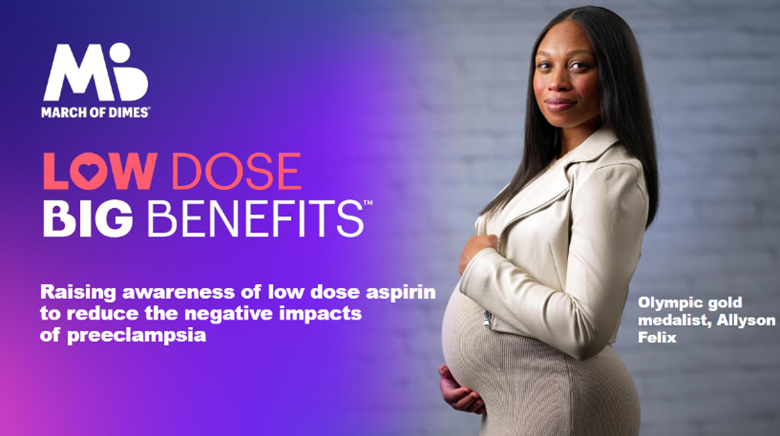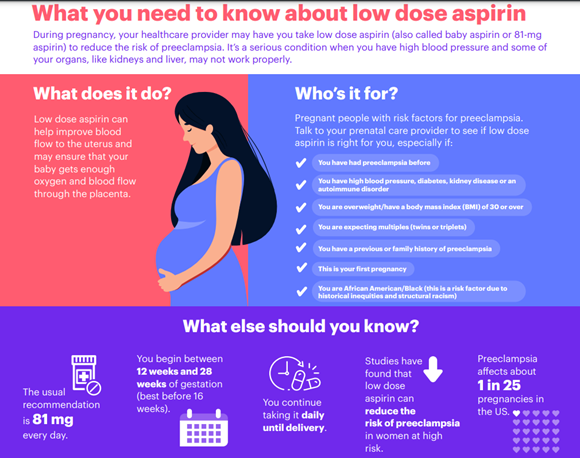Written by Dr. Elizabeth Cherot, March of Dimes President and CEO
According to the Centers for Disease Control and Prevention (CDC), 80% of pregnancy-related deaths are preventable and hypertensive disorders of pregnancy, like preeclampsia, are among the leading causes of confirmed maternal deaths, particularly for Black moms. Preeclampsia affects 1 in 25 pregnancies in the U.S., with potential negative impacts on mom and baby during pregnancy, labor, delivery, and beyond. It can cause high blood pressure and some of the pregnant person’s organs to not work properly, resulting in maternal and infant health problems or death, and the health problems can last their entire life. But wait, there is good news. Studies have shown low dose aspirin may reduce the risk of preeclampsia in pregnant individuals at risk for the condition. And March of Dimes and Chamber of Mothers want to be sure you know what to ask your doctor.
This May, during Preeclampsia Awareness Month, March of Dimes launched Low Dose, Big Benefits™, an awareness and education campaign aimed at decreasing the adverse effects of preeclampsia and preterm birth through a better understanding of the potential positive impact of low dose aspirin during pregnancy. Through the campaign, we’re also promoting the importance of equal access to critical information for all families and healthcare providers.
So, what to know: all pregnant people should be screened for preeclampsia at their first prenatal care visit or ideally before 12 weeks to determine if they’re at risk for preeclampsia and therefore a candidate for taking low dose aspirin. Learn more about the risk factors for preeclampsia. And ASK your doctor if it might be right for you.

Here is a story I would like to share with you from eleven-time Olympic medalist Allyson Felix who experienced preeclampsia during her first pregnancy:
“I had what I thought was a really great pregnancy. I was training throughout it, and I felt strong. But then I went to a routine doctor’s appointment at 32 weeks, and I found out immediately that I was spilling protein.”
Allyson Felix, Olympic gold medalist
When excess protein is detected in urine during pregnancy, it may be a sign of anything from stress to fever to preeclampsia. For Allyson, the diagnosis was, in fact, preeclampsia. Even though 1 in 25 pregnant people experience preeclampsia—with Black people at higher risk due to environmental, social, and historical inequities—it isn’t a widely known condition.
Black women also experience a preterm birth rate 55% higher than other women, with their babies 2.4 times more likely to die compared to White women.
“I remember sitting in that hospital bed when they came over and told me that, and I didn’t even know what preeclampsia meant. It was a very scary situation. I didn’t understand the severity of what was happening with my own health, but there was a lot happening and happening really quickly.”
Allyson Felix
Allyson grappled with the fear of what lay ahead: the risk of having a stroke or losing her vision—or worse. Allyson was rushed into an emergency Cesarean birth (also known as C-section) due to complications at 32 weeks with her daughter Camryn weighing just 3 pounds, 7 ounces. They spent the next month in the NICU learning about their baby and the maternal health crisis, prompting Allyson to get involved to help other families learn steps to prevent preterm birth. When Allyson and her husband Kenneth found out they were pregnant again, they couldn’t shake the vivid recollection of her first pregnancy.
During Allyson’s second pregnancy, she discussed her risk factors with her healthcare professionals and decided to take low dose aspirin to reduce the risk of preeclampsia again. Allyson took low dose aspirin leading up to the birth of her second baby, who was born full term this past April. We’re honored Allyson wants to work with our organization on this campaign as her firsthand experience is so powerful. Read more of Allyson’s story.
Despite its lifesaving potential, the benefits of low dose aspirin to reduce the risk of preeclampsia are not widely known by pregnant people and the general public. A new survey conducted by The Harris Poll on behalf of March of Dimes revealed nearly 1 in 5 families had never heard of preeclampsia with the number rising to over 1 in 4 for Black families. It’s important to note that preeclampsia is a key driver of maternal and infant mortality and morbidity. Because we know low dose aspirin can improve outcomes for both mom and baby, we want to equip all soon to be moms, families, and healthcare providers with the knowledge and tools they need to proactively manage their pregnancies. I’m hopeful that together we can make significant strides in reducing the incidence of negative maternal and infant outcomes.

Please join us as we continue to spread the word through our Low Dose, Big Benefits™ campaign and work to end preterm birth and fight for the health of all moms and babies.
Visit marchofdimes.org/lowdosebigbenefits to learn more about risk factors for preeclampsia and how the safe use of low dose aspirin could benefit those who are pregnant and soon to be pregnant.
